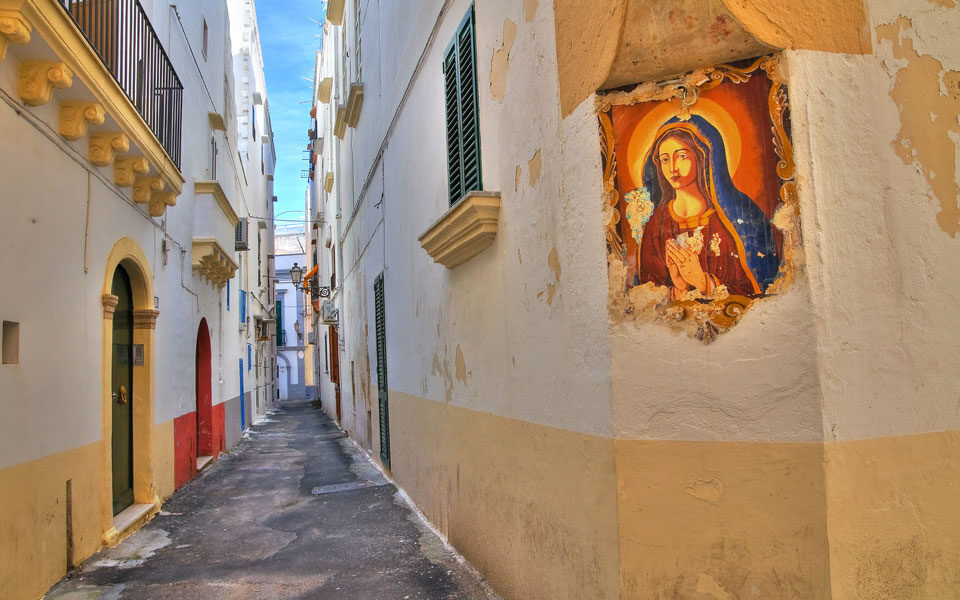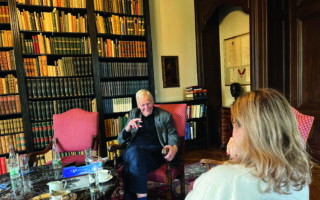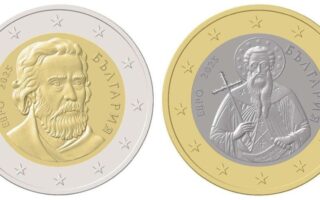‘Teli na cusi tin glossa grika?’
How a Greek language lives on in southern Italy

With its sugarcube houses, labyrinthine streets and hyper-Baroque churches, Corigliano d’Otranto seems at first like any other village in Italy’s southern Salento region. But as you wander around and explore, an entirely different world begins to reveal itself.
“Teli na cusi tin glossa grika?” asks a sign on the main square. “Cai ‘na percorso amesa tus monumentu pleon orriu so chorio paleo pu Coriana?”
If you’re an Italian speaker, you might be feeling a little lost. But if you’re a Greek speaker, then these words will evoke an odd sense of familiarity. That’s because this is Griko – a language closely related to Greek and spoken in a small microregion of Salento known as Grecia Salentina.
My guide to this world-within-a-world is Dr Manuela Pellegrino, a native of the region and author of “Greek Language, Italian Landscape: Griko and the Re-storying of a Linguistic Minority.” She was born and raised in Zollino, one of seven villages in Salento where Griko can still be heard. At 47, she is one of its youngest fluent speakers.
“For me Griko was always there growing up,” she says. “My grandmother would speak it to my parents at home, though my parents preferred to speak to me in Salentino, the local Italian dialect.” Curious about Grandma’s language, she began whimsically recording the words, phrases and grammar in her notebooks. Her spoken Griko remained rudimentary, though the language engendered a profound sense of meaning in her. After graduating in foreign languages from the University of Salento, she embarked on a PhD in anthropology, investigating the past and present of Griko, ultimately deciding to return to her home village and make a concerted effort to master the language.
“I would literally follow all the elderly Griko speakers around as they went about their daily activities – gardening, cooking, meeting with friends. I would insist they speak to me only in Griko,” she recalls.
And what was their response?
“A polite curiosity. They found it difficult to speak casually with someone so young and made fun of my mistakes. Perhaps this was a kind of revenge for when we would make fun of their mistakes in Italian.”
The origins of the Grikos are something of a mystery, even to themselves. Romantics herald them as the last remnants of the once vast Greek-speaking colonies of Magna Graecia, but linguists who have studied Griko grammar say it has more in common with modern than with ancient Greek. Perhaps the Greek language was reintroduced (or reinforced) by the arrival of Greek refugees in southern Italy during the Ottoman incursions into Europe? Again, no one is quite sure. The Grikos have no great origin story. They’ve just always been here.
Since their “rediscovery” in the early 1990s, they have been the targets of intense mythmaking and ideological self-interest. Pellegrino is weary of these internecine debates over identity. She stresses that – apart from their language – speakers of Griko do not consider themselves culturally different from other Salentines and regard themselves as a linguistic minority rather than an ethnic or national one.
In 1994, the Greek state – alarmed that there appeared to be a Greek minority abroad which they hadn’t known about – began dispatching Greek teachers to the villages. These Modern Greek language classes were mostly attended by pensioners with nothing to do and curious about the links between the two languages. Having had less impact than the Greek state had perhaps hoped, the program was quietly discontinued during the financial crisis and only recently reactivated.
“Locals still debate whether learning Modern Greek can help preserve Griko,” says Pellegrino. “But in the 90s, contact between our community and Greece intensified, which significantly influenced Griko language and culture.”
Since then, the Griko language has undergone – if not quite a revival – then a reinvention. What was once stigmatized as a peasant vernacular at odds with Italian nation-building has been recast as something lofty, romantic and cool. Much to the bemusement of its elderly mother-tongue speakers, Griko has become something of a brand.
Partially, this has to do with the reinvention of Salento itself, previously a poor and forsaken corner of Italy, now increasingly popular with both Italian and foreign visitors. The uptick in the region’s economic prospects coincided with a revival in folk and cultural traditions, such as the pizzica and tarantella dances, which had been largely abandoned. Griko became a part of this revival.
In 1999, the Italian state officially recognized Griko as one of Italy’s historical minority languages and in 2001 the Union of the Municipalities of Grecia Salentina was formed. It includes the seven villages where Griko is still spoken – Calimera, Castrignano de’ Greci, Corigliano d’Otranto, Martano, Martignano, Sternatia and Zollino – in addition to four villages – Carpignano Salentino, Cutrofiano, Melpignano and Soleto – where Griko has not been spoken for one or two centuries. Being part of the Grecia Salentina union grants its members the right to claim a lofty inheritance and a distinctive brand, but there are economic incentives too: access to lucrative European funds which are available for ethnic, linguistic and cultural minorities.
Suddenly the language has appeared in the names of restaurants, bars, B&Bs, cultural associations, municipal projects and advertisements. It has recently been used in brand names for local products (such as beer) and even in the names of political parties in local elections. “I’m often asked to translate signs into Griko,” says Pellegrino. “But this isn’t always easy, as Griko is essentially a pastoral language and lacks the vocabulary of modernity, so we are forced to borrow words from Salentino, Italian and – more recently – modern Greek.” Some locals have even started adorning their shops with signs written in the Greek alphabet, which the majority of the community cannot read. “These are just two examples of how modern Greek has seeped into Griko,” says Pellegrino.
The language is sporadically demonstrated in schools and Pellegrino helps run an annual Griko summer camp called I Ddomada Grika (The Griko Week). In 2022, the Greek president visited the region, her presence granting these back-of-beyond villages a rare moment in the spotlight.
In tandem with this has been a renewed interest in Griko as a language of artistic expression. Numerous bands and poets have emerged within the language’s cultural landscape and Grecia Salentina has become the center of the revived Notte della Taranta, of which Griko music plays an integral part. The final night’s concert, held in the village of Melpignano, has now become a mega-event, attended by up to 200,000 people and broadcast live on Rai 1. It typically ends with a rousing rendition of “Calinitta” (Goodnight), which has become something of a Griko anthem.
“If we judge the life of a language based on its day-to-day utility, then Griko has been dead for a long time,” says Pellegrino. “What’s interesting is how the language has been reappropriated. Nowadays, when people speak Griko they do so because they ‘want to’ and not because they ‘need to.’ So as the language declines in traditional use, it is reborn as a kind of metalanguage, in which the use of Griko becomes a performative comment on the meaning of Griko itself.”
Such is the paradox of a language that is always dying but never actually dead. As the contemporary Griko writer Paolo Di Mitri puts it: “O Grikomma pesane? Refrisko n’achi. Ce mi pu grafome grika, imesta pesammeni? Esi ka mas meletate pesanato?” (Has Griko died? May it rest in peace. Are we who write Griko then dead? Are you then, reading it, dead?)
Alex Sakalis is a writer and journalist whose work has appeared on the BBC and in The Economist and The Guardian, among others. He lives in Bologna, Italy.





